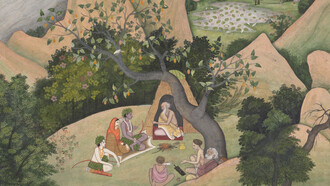The year 1966 proved to be monumental in my racial definition. It was the year that I became “Black.”
Only months after I received my undergraduate degree, Stokely Carmichael shouted “Black Power” and instantly changed not only my racial identity but my consciousness. In October of 1966, Huey P. Newton and Bobby Seale created the Black Panther Party, which would impact the consciousness of all Black Americans and America itself.
Even more than the Civil Rights Movement, the Black Power Movement has had the most significant impact on the consciousness of those of us designated as “black,” “inferior,” "inhuman,” and “other.” The Black Power Movement refuted the ideology of white superiority and Black inferiority; it made “Blackness” a consciousness of power rather than a label of victimhood. Those “Black” in consciousness did not have to assimilate, acculturate, or be accepted by white society. Black Power taught us that Blackness is its own beauty, agency, and power.
Before the Black Power Movement, many “coloreds” and “Negroes” were as disdainful of Black skin as whites. There were fights resulting from being called “black” and nicknames such as “Smoky” or “Blue” given to those with very dark skin. Even today, there are Black adults who because of skin-color harassment as children hate themselves and other Black people. Even Negro institutions reinforced the belief that Black skin was inferior; top-ranked Negro colleges asked for photos on admission forms, and college queens were always “light, bright and almost white.” Colorism was pervasive in the Negro community.
The conscious of “Black Power” was not new. The agency of the obvious self-determination of Black communities during Jim Crow, erased from history books, was lost to us. What Stokely proclaimed had been present, though not so named, was alive and well in vibrant, self-sufficient, and prosperous Black communities during the Jim Crow era. Without white direction or assistance, Black people had created dynamic educational, social, and business institutions that rivaled those in white society. Autonomous, segregated Black communities proved that Black inferiority was a myth. Stokely’s call brought us out of our state of forgetfulness. We as a people became proud again—and maybe for the first time—of who we were, what our culture meant to us, and the power that we held.
The Black Power Movement of the 1960s and 1970s grew out of and along with the Civil Rights Movement, calling for a sense of self-determination and the independent development of social and political institutes for Black people. Black Power emphasized racial pride and self-reliance rather than integration. Black Power focused on building power in our own as a people rather than seeking accommodation from white power structures. It promoted solidarity and using our collective power to determine our future in this society.
The Black Power Movement promoted racial pride, self-respect, and the acknowledgement of the beauty and dynamism of our culture. The Black Power Movement promoted the creation of Black political and cultural institutes, the demand for Black history courses, and Black bookstores. We as a people became self-focused as a race in all respects—our art, literary pursuits, and music as much as our financial and political growth. James Brown sang, “I’m Black and I’m Proud.” Most pronounced to me as a former colored girl was our definition of beauty: “Black is beautiful,” and our afros were the rage.
Most critically to me, the revolutionary call for Black Power reverberated in my consciousness, for it was already this colored girl’s self-identity, self-worth, and self-determination. These character traits had been slowly, deliberately, and consciously given to me all my life as the norm—for me—in the era of segregation and prejudice. It was, however, with the Black Power Movement that I embraced it openly and proudly.
The call for Black Power renewed my sense of self as I crystalized the lessons of self-identity, self-worth, and self-determination learned from family and community. First, my own family and then my segregated education by dedicated colored teachers came to the fore in my consciousness and allowed my already honed sense of competency and confidence to burst out into the expectation that I pursue excellence in my every endeavor.















